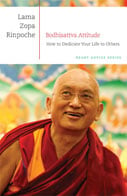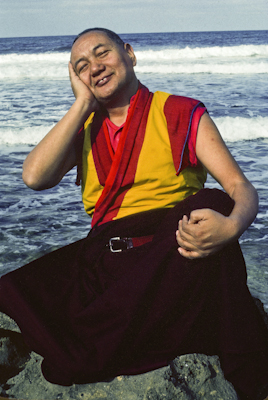Dear LYWA friends and supporters,
Thank you for your kind interest in the Archive. Losar tashi delek! Happy Tibetan New Year!
Well, I’m writing to you from Singapore, which is one of my favorite places and where we have many friends. I’m staying at the beautiful and inspiring Amitabha Buddhist Centre. Unfortunately, for reasons we all know, Lama Zopa Rinpoche is not giving his annual teachings here this year but we hope he will do so next year. We wait and see. Anyway, I’ll be here until March 13th, with a side trip to Malaysia March 2 to 6. I’m looking forward to catching up with everybody here. Send me an email, or call or SMS me at 9778-5435, if you'd like to get together.
Updates on Lama Zopa Rinpoche's Health
And speaking of Rinpoche, the latest we have is that after attending the Kalachakra initiation in Bodhgaya, Rinpoche has gone to Kopan for the Tibetan New Year and to continue his rehabilitation. You can read more in the recent FPMT newsletter.
For the latest on Rinpoche's health you can always visit the Official Updates and Practices page on the FPMT website.
Publications update We're delighted that our next free book, Rinpoche’s Bodhisattva Attitude: How to Dedicate Your Life to Others, is finally at the printer's and we look forward to sending it out to all our members and benefactors next month.
We're delighted that our next free book, Rinpoche’s Bodhisattva Attitude: How to Dedicate Your Life to Others, is finally at the printer's and we look forward to sending it out to all our members and benefactors next month.
If you are not already a member or benefactor, please consider joining us with your donation today. If we receive your donation by March 2nd you'll automatically be sent a copy of Bodhisattva Attitude when it arrives, along with any other free book we publish for the next year.
For the first time, we will simultaneously publish our new title as an ebook! If you're a member or benefactor and would prefer to receive your free copy in electronic format, please let us know. This will help us keep down our mailing costs, which continue to rise.
We are also reprinting three of our most popular free books: Lama Yeshe's Becoming Your Own Therapist and Lama Zopa Rinpoche's Virtue and Reality and How Things Exist. If you have somehow missed out on these before we’d be happy to send any or all of them to you. They are also available as eBooks; see our website for links.
What's New On Our Website
Read a teaching from Lama Zopa Rinpoche from 2003 on The Importance of the Three Principal Aspects of the Path. In this short teaching, Lama Zopa Rinpoche emphasizes the importance of the three principal aspects: renunciation, right view and bodhicitta. This teaching was originally published in Mandala Magazine in 2004.
Read a wonderful advice that Rinpoche sent to a young student about Removing Obstacles and Collecting Merit. Rinpoche gives detailed instructions on how to make offerings, ending with a special note about how "one of the highest ways to make offerings is to offer to the guru's pores."
We have also posted a letter Rinpoche sent to a student who asked what was best for her life after her children had left home. Rinpoche replies with extensive practice recommendations, including 300 nyung-näs and many other practices.
 Read also a lengthly advice from Rinpoche on how to understand seeing faults in one's guru; advice to someone with an eating disorder; advice given after the Japanese tsunami and radiation leak; and a letter to Rinpoche's dentist, where Rinpoche explains that when brushing his teeth:
Read also a lengthly advice from Rinpoche on how to understand seeing faults in one's guru; advice to someone with an eating disorder; advice given after the Japanese tsunami and radiation leak; and a letter to Rinpoche's dentist, where Rinpoche explains that when brushing his teeth:
... when I remember I try to do a meditation that the toothbrush is purifying all the obscurations of sentient beings and the toothpaste is the path to enlightenment—method and wisdom.
A daily practice for us all.
As usual, these are highlights from only a few of the many new advices posted to the Online Advice Book this month; you can see a listing of all the new posts here.
Foreign Language Translations
We continue to add new foreign translations of the teachings of Lama Yeshe and Lama Zopa Rinpoche to our website. This past month we posted the Slovenian translation of one of the chapters from Lama Yeshe's Make Your Mind an Ocean. It is available as a pdf on our website.
We are grateful to the translators of all our publications, and encourage others who want to translate our texts to get in touch with us. Visit our website to see a list of all known translations of LYWA publications. If you know of more, please let us know.
This month we leave you with an excerpt from our next book, Lama Zopa Rinpoche’s How to Practice Dharma: Teachings on the Eight Worldly Dharmas, which we hope will be available by this summer.
Thank you again for your kind support of our work for the benefit of others. We are all so fortunate to be able to help other sentient beings receive Dharma teachings, the solution to suffering and the true cause of happiness.
Much love, 
Nick Ribush
Director
This Month's Teaching: Meditation on the Sound of Praise and Criticism
 You can learn much about your mind by being aware of how it reacts to praise and criticism. How pleased are you when somebody praises you? How depressed are you when you are criticized? Even if you logically know that neither the praise nor the criticism is justified, it is very difficult to separate your mind from the situation and have a more realistic attitude to these two worldly dharmas. Here is a meditation that will help.
You can learn much about your mind by being aware of how it reacts to praise and criticism. How pleased are you when somebody praises you? How depressed are you when you are criticized? Even if you logically know that neither the praise nor the criticism is justified, it is very difficult to separate your mind from the situation and have a more realistic attitude to these two worldly dharmas. Here is a meditation that will help.
Think of a compliment or some praise that you’ve recently received. Don’t worry whether you feel you deserved it or not, just concentrate on the way your mind reacted to it. Were you genuinely pleased to receive that praise without any exaggeration of the mind or did your mind immediately become attached to it? Explore how much you need praise.
Perhaps somebody as praised your wisdom—“How wise you are.” Immediately your mind wraps itself around this sentence and you feel very happy. But really, where is the real happiness in those four words? They are just sounds hitting your ears. If they were a true source of happiness then every time you heard them you would be as happy. If there were some absolute existence in that sentence, then just saying “How wise you are” to yourself would have exactly the same effect. Does it?
It could be your mantra. You could repeat it over and over to yourself, counting your mala—how wise you are, how wise you are, how wise you are. If it were real happiness, the more you repeated it the happier you would become. You could record it and play it back to yourself all day every day and you would be the happiest person in the world. But of course it is not like that.
Take each word and see whether there is happiness there. Is there some intrinsic happiness in “how” or in “wise,” in “you” or in “are.” Of course not. The individual words themselves are no reason for attachment, so why is the whole sentence?
Experiment like this and see how the happiness you feel when praised does not come from the side of the words themselves. The words themselves are empty sounds; the meaning comes from your own mind.
In the same way, if you check whether “You are so terrible” really exists, you will find that what you believe to exist is utterly nonexistent. You get angry and upset when somebody says that, the actual sentence brings pain to your heart, but really it’s only a group of sounds hitting your ear. How can it have that effect? You believe the sentence, but examine each word. Do you get angry with the “you” of “you are so terrible?” There’s no point in getting angry at a “you.” And there’s no point in getting angry at the word “terrible.” Does just hearing the sound “terrible” make you angry?
If you add a “no” to “you are good” you get a negative sentence, “You are no good.” Those two letters “n” and “o” change the sentence around. The first sentence doesn’t have “no”; the second one does. You don’t get angry when you hear the word “no” alone, so why get angry at the whole sentence? Is it because the combination of words is related to you? If this is so, then when you tell yourself you are no good, it should cause you to get angry in exactly the same way.
The moment you discover the emptiness of the object that you believed in before, your feeling changes. There’s no problem in your mind, no confusion. All of a sudden, by checking like this, your attachment or aversion diminishes and your mind becomes much more relaxed and happier than before. The wrong conception that held the truth to be in that group of sounds simply vanishes, and with it the attachment or aversion you felt because of those words. You can’t find the truly-existing object of your negative emotion, so it is naturally dispelled. This way you keep your mind peaceful. You become your own doctor, psychologist and psychiatrist and bring peace to your own life.
Excerpted from Lama Zopa Rinpoche's How to Practice Dharma: Teachings on the Eight Worldly Dharmas, edited by Gordon McDougall. Forthcoming 2012 from the Lama Yeshe Wisdom Archive.





























